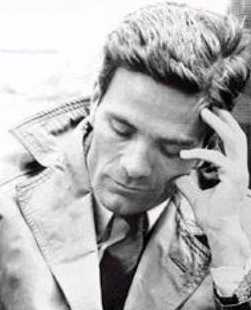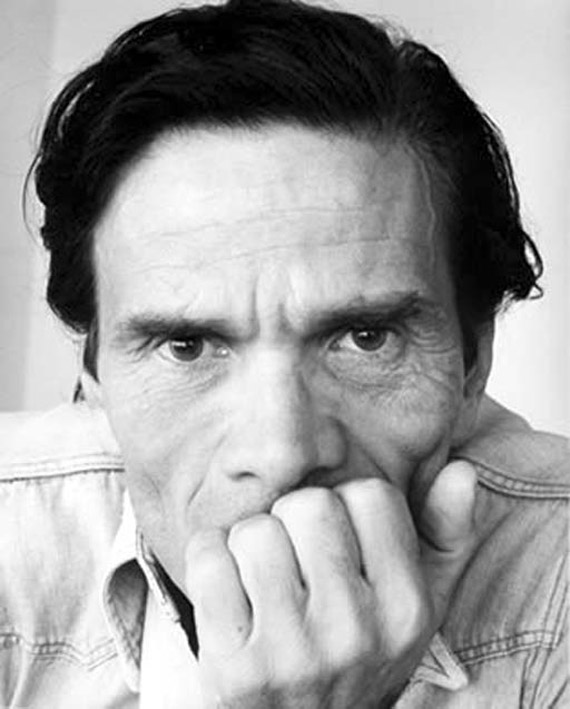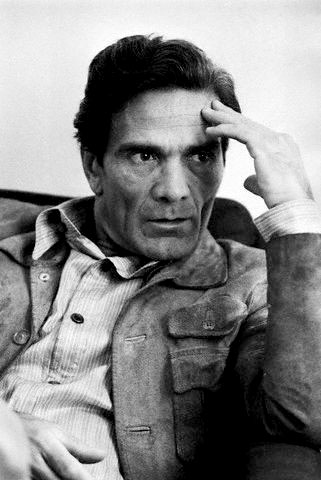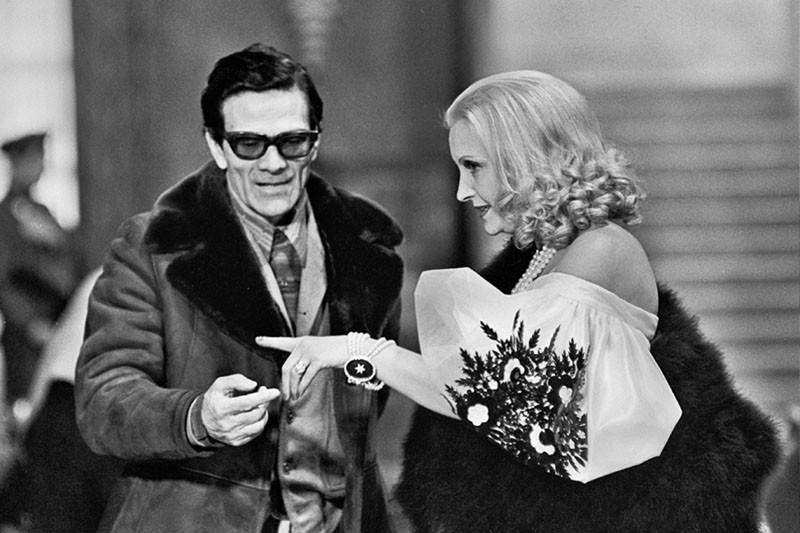<Back to Index>
- Cartographer Gerardus Mercator, 1512
- Writer and Film Director Pier Paolo Pasolini, 1922
- 1st Premier of the People's Republic of China Zhou Enlai, 1898
PAGE SPONSOR



Pier Paolo Pasolini (March 5, 1922 – November 2, 1975) was an Italian poet, intellectual, film director, and writer. Pasolini distinguished himself as a poet, journalist, philosopher, linguist, novelist, playwright, filmmaker, newspaper and magazine columnist, actor, painter and political figure. He demonstrated a unique and extraordinary cultural versatility, becoming a highly controversial figure in the process.
Pasolini was born in Bologna, traditionally one of the most leftist of Italian cities. He was the son of a lieutenant of the Italian Army, Carlo Alberto, who had become famous for saving Benito Mussolini's life, and who married an elementary school teacher, Susanna Colussi, in 1921. Pasolini was born in 1922 and was named after his paternal uncle. His family moved to Conegliano in 1923 and, two years later, to Belluno, where another son, Guidalberto, was born. In 1926, Pasolini's father was arrested for gambling debts, and his mother took the children to her family's house in Casarsa della Delizia, in the Friuli region.
Pasolini began writing poems at the age of seven, inspired by the natural beauty of Casarsa. One of his early influences was the work of Arthur Rimbaud. In 1933 his father was transferred to Cremona, and later to Scandiano and Reggio Emilia. Pasolini found it difficult to adapt to all these moves, though in the meantime he enlarged his poetry and literature readings (Dostoyevsky, Tolstoy, Shakespeare, Coleridge, Novalis) and left behind the religious fervour of his early years. In the Reggio Emilia high school, he met his first true friend, Luciano Serra. The two met again in Bologna, where Pasolini spent seven years while completing high school: here he cultivated new passions, including football. With other friends, including Ermes Parini, Franco Farolfi, Elio Meli, he formed a group dedicated to literary discussions.
In 1939 Pasolini graduated and entered the Literature College of the University of Bologna, discovering new themes such as philology and aesthetics of figurative arts.
He also frequented the local cinema club. Pasolini always showed his
friends a virile and strong exterior, totally hiding his interior
travail. He took part in the Fascist government's culture and sports competitions. In 1941, together with Francesco Leonetti, Roberto Roversi and
others, he attempted to publish a poetry magazine, but the attempt
failed due to paper shortages. In his poems of this period, Pasolini
started to include fragments in Friulian, which he had learned from his mother. After the summer in Casarsa, in 1941 Pasolini published at his own expense a collection of poems in Friulian, Versi a Casarsa. The work was noted and appreciated by intellectuals and critics such as Gianfranco Contini, Alfonso Gatto and Antonio Russi. His pictures had also been well received. Pasolini was chief editor of the Il Setaccio ("The
Sieve") magazine, but was fired after conflicts with the director, who
was aligned with the Fascist regime. A trip to Germany helped him also
to discover the "provincial" status of Italian culture in that era.
These experiences led Pasolini to rethink his opinion about the
cultural politics of Fascism and to switch gradually to a Communist position. In 1942, the family took shelter in Casarsa, considered a more tranquil place to wait for the conclusion of the war,
a decision common among Italian military families. Here, for the first
time, Pasolini had to face the erotic disquiet he had suppressed during
his adolescent years. He wrote: "A continuous perturbation without
images or words beats at my temples and obscures me". In the weeks before the 8 September armistice, Pasolini was drafted. He was captured and imprisoned by the Germans.
He managed to escape disguised as a peasant, and found his way to
Casarsa. Here he joined a group of other young fans of the Friulian
language who wanted to give Casarsa Friulian a status equal to that of Udine, the official regional dialect. From May 1944 they issued a magazine entitled Stroligùt di cà da l'aga. In the meantime, Casarsa suffered Allied bombardments and forced enrollments by the Italian Social Republic, as well as partisan activity. Pasolini tried to remain apart from these events. He and his mother taught students unable to reach the schools in Pordenone or Udine. He experienced his first homosexual love for one of his students. At the same time, a Slovenian schoolgirl,
Pina Kalč, was falling in love with Pasolini. On 12 February 1945 his
brother Guido was killed in an ambush. Six days later Pasolini and
others founded the Friulian Language Academy (Academiuta di lenga furlana).
In the same year Pasolini joined the Association for the Autonomy of
Friuli. He graduated after completing a final thesis about Giovanni Pascoli's works. In 1946 Pasolini published a small poetry collection, I Diarii ("The Diaries"), with the Academiuta. In October he travelled to Rome. The following May he began the so-called Quaderni Rossi, handwritten in old school exercise books with red covers. He completed a drama in Italian, Il Cappellano. His poetry collection, I Pianti ("The cries"), was also published by the Academiuta. On 26 January 1947 Pasolini wrote a controversial declaration for the front page of the newspaper Libertà:
"In our opinion, we think that currently only Communism is able to
provide a new culture." The controversy was partly due to the fact he
was still not a member of the Italian Communist Party (PCI). He was also planning to extend the work of the Academiuta to other Romance language literatures and knew the exiled Catalan poet, Carles Cardó. After his adherence to the PCI, he took part in several demonstrations. In May 1949, Pasolini attended the Peace Congress in Paris.
Observing the struggles of workers and peasants, and watching the
clashes of protesters with Italian police, he began to create his first
novel. In
October of the same year, Pasolini was charged with the corruption of
minors and obscene acts in public places. As a result, he was expelled
by the Udine section of the Communist Party and lost the teaching job
he had obtained the previous year in Valvasone. Left in a difficult
situation, in January 1950 Pasolini moved to Rome with his mother. He
later described this period of his life as very difficult. "I came to
Rome from the Friulian countryside. Unemployed for many years; ignored
by everybody; riven by the fear to be not as life needed to be".
Instead of asking for help from other writers, Pasolini preferred to go
his own way. He found a job as a worker in the Cinecittà studios and sold his books in the 'bancarelle' ("sidewalk shops") of Rome. Finally, through the help of the Abruzzese language poet Vittorio Clemente, he found a job as a teacher in Ciampino, a suburb of the capital. In these years Pasolini transferred his Friulian countryside inspiration to Rome's suburbs, the infamous borgate where poor proletarian immigrants lived in often horrendous sanitary and social conditions. In
1954, Pasolini, who now worked for the literary section of Italian
state radio, left his teaching job and moved to the Monteverde quarter, publishing La meglio gioventù, his first important collection of dialect poems. His first novel, Ragazzi di vita (English: Rent boys), was published in 1955. The work had great success but was poorly
received by the PCI establishment and, most importantly, by the Italian
government. It initiated a lawsuit against Pasolini and his editor,
Garzanti. Though totally exonerated of any charge, Pasolini became a
victim of insinuations, especially by the tabloid press. In 1957, together with Sergio Citti, Pasolini collaborated on Federico Fellini's film Le notti di Cabiria, writing dialogue for the Roman dialect parts. In 1960 he made his debut as an actor in Il gobbo, and co-wrote Long Night in 1943. His first film as director and screenwriter is Accattone of
1961, again set in Rome's marginal quarters. The movie aroused
controversy and scandal. In 1963, the episode "La ricotta", included in
the collective movie RoGoPaG, was censored and Pasolini was tried for offence to the Italian state. During this period Pasolini frequently traveled abroad: in 1961, with Elsa Morante and Alberto Moravia to India (where he went again seven years later); in 1962 to Sudan and Kenya; in 1963, to Ghana, Nigeria, Guinea, Jordan, and Israel (where he shot the documentary, Sopralluoghi in Palestina). In 1970 he travelled again to Africa to shoot the documentary, Appunti per un'Orestiade africana. In 1966 he was a member of the jury at the 16th Berlin International Film Festival. The
late 1960s and early 1970s were the era of the so-called "student
movement". Pasolini, though acknowledging the students' ideological
motivations, thought them "anthropologically middle-class" and
therefore destined to fail in their attempts at revolutionary change.
Regarding the Battle of Valle Giulia,
which took place in Rome in March 1968, he said that he sympathized
with the police, as they were "children of the poor", while the young
militants were exponents of what he called "left wing fascism". His
film of that year, Teorema, was shown at the annual Venice Film Festival in a hot political climate. Pasolini had proclaimed that the Festival would be managed by the directors. In 1970 Pasolini bought an old castle near Viterbo, several miles north of Rome, where he began to write his last novel, Petrolio, which was never finished. In 1972 he started to collaborate with the extreme left association Lotta Continua, producing a documentary, 12 dicembre, concerning the Piazza Fontana bombing. The following year he began a collaboration for Italy's most renowned newspaper, Il Corriere della Sera. At the beginning of 1975 Garzanti published a collection of critical essays, Scritti corsari ("Corsair Writings"). Pasolini was murdered by being run over several times with his own car, dying on 2 November 1975 on the beach at Ostia, near Rome. Pasolini was buried in Casarsa, in his beloved Friuli. Giuseppe Pelosi, a seventeen year old hustler,
was arrested and confessed to murdering Pasolini. Thirty years later,
on 7 May 2005, he retracted his confession, which he said was made
under the threat of violence to his family. He claimed that three
people "with a southern accent" had committed the murder, insulting
Pasolini as a "dirty communist". Other
evidence uncovered in 2005 pointed to Pasolini having been murdered by
an extortionist. Testimony by Pasolini's friend Sergio Citti indicated
that some of the rolls of film from Salò had been stolen, and that Pasolini had been going to meet with the thieves after a visit to Stockholm, November 2, 1975. Despite the Roman police's reopening of the murder case following Pelosi's
statement of May 2005, the judges charged with investigating it
determined the new elements insufficient for them to continue the
inquiry. Pasolini's first novel Ragazzi di vita (1955) dealt with the Roman lumpen proletariat. The resulting obscenity charges against him were the first of many instances where his art provoked legal problems. Accattone (1961), also about the Roman underworld, also provoked controversy with conservatives, who demanded stricter censorship. He then directed the black-and-white The Gospel According to St. Matthew (1964). This film is widely hailed as the best cinematic adaptation of the life of Jesus (Enrique Irazoqui).
Whilst filming it, Pasolini vowed to direct it from the "believer's
point of view", but later, upon viewing the completed work, saw he had
instead expressed his own beliefs. In his 1966 film, Uccellacci e uccellini (literally Bad Birds and Little Birds but translated in English as The Hawks and the Sparrows), a picaresque - and at the same time mystic - fable, he hired the great Italian comedian Totò to work with one of his preferred "naif" actors, Ninetto Davoli. It was a unique opportunity for Totò to demonstrate that he was a great dramatic actor as well. In Teorema (Theorem, 1968), starring Terence Stamp as a mysterious stranger, he depicted the sexual coming apart of a bourgeois family (later repeated by François Ozon in Sitcom and Takashi Miike in Visitor Q). Later movies centered on sex laden folklore, such as Boccaccio's Decameron (1971) and Chaucer's Canterbury Tales (1972), and Il fiore delle mille e una notte (literally The Flower of 1001 Nights, released in English as Arabian Nights, 1974). These films are usually grouped as the Trilogy of Life. His final work, Salò (Salò, or the 120 Days of Sodom, 1975), exceeded what most viewers could then stomach in its explicit scenes of intensely sadistic violence. Based on the novel 120 Days of Sodom by the Marquis de Sade, it is considered his most controversial film. In May 2006, Time Out's Film Guide named it the Most Controversial Film of all time. As a director, Pasolini created a picaresque neorealism, showing a sad reality. Many people did not want to see such portrayals in artistic work for public distribution. Mamma Roma (1962), featuring Anna Magnani and
telling the story of a prostitute and her son, was an affront to the
morality of those times. His works, with their unequaled poetry applied
to cruel realities, showing that such realities are less distant from
us than we imagine, made a major contribution to change in the Italian
psyche. The
director also promoted in his works the concept of "natural
sacredness," the idea that the world is holy in and of itself. He
suggested there was no need for spiritual essence or supernatural
blessing to attain this state. Pasolini was an avowed atheist. General
disapproval of Pasolini's work was perhaps caused primarily by his
frequent focus on sexual mores, and the contrast between what he
presented and publicly sanctioned behavior. While Pasolini's poetry
often dealt with his same sex love interests, this was not the only, or
even main, theme. His interest and approach to Italian dialects should
also be noted. Much of the poetry was about his highly revered mother.
As a sensitive and intelligent man, he depicted certain corners of the
contemporary reality as few other poets could do. His poetry was not as
well known as his films outside Italy. His films won awards at the Berlin Film Festival, Cannes Film Festival, Venice Film Festival, Italian National Syndicate for Film Journalists, Jussi Awards, Kinema Junpo Awards, International Catholic Film Office and New York Film Critics Circle. Pasolini
generated heated public discussion with controversial analyses of
public affairs. For instance, during the disorders of 1969, when the autonomist university
students were carrying on a guerrilla like uprising against the police
in the streets of Rome and all the leftist forces declared their
complete support for the students, describing the disorders as a civil
fight of proletariat against the System, Pasolini, alone among the
communists, declared that he was with the police; or, more precisely,
with the policemen. He considered them true proletariat, sent to fight
for a poor salary and for reasons which they could not understand,
against pampered boys of their same age, because they had not had the
fortune of being able to study, referring to poliziotti figli di proletari meridionali picchiati da figli di papà in vena di bravate (lit. policemen, sons of proletarian southerners, beaten up by arrogant daddys' boys ). This ironic statement, however, did not stop him from contributing to the autonomist Lotta continua movement. Pasolini was also an ardent critic of consumismo, i.e. consumerism,
which he felt had rapidly destroyed Italian society in the late
1960s/ early 1970s. He was particularly concerned about the class of the subproletariat, which he portrayed in Accattone,
and to which he felt both humanly and artistically drawn. Pasolini
observed that the kind of purity which he perceived in the
pre-industrial popular culture was rapidly vanishing, a process that he
named la scomparsa delle lucciole (lit. "the disappearance of glow-worms"). The joie de vivre of the boys was being rapidly replaced with more bourgeois ambitions such as a house and a family. He described the coprophagia scenes in Salò as
a comment on the processed food industry. He often described
consumeristic culture as "unreal", as it had been imposed by economical
power and had replaced Italy's traditional peasants culture, something
that not even fascism had been able to do. In one interview, he said: "I hate with particular
vehemency the current power, the power of 1975, which is a power that
manipulates bodies in a horrible way; a manipulation that has nothing
to envy to that performed by Himmler or Hitler". He was angered by economic globalization and the cultural domination of the North of Italy (around Milan) over other regions, especially the South. He felt this was accomplished through the power of TV. He opposed the gradual disappearance of Italian dialects by writing some of his poetry in Friulian, the regional language of his childhood. Despite his left wing views, Pasolini opposed the liberalization of abortion laws. The LGBT encyclopedia states the following regarding Pasolini's homosexuality: While
openly gay from the very start of his career (thanks to a gay sex
scandal that sent him packing from his provincial hometown to live and
work in Rome), Pasolini rarely dealt with homosexuality in his movies. The subject is featured prominently in Teorema (1968), where Terence Stamp's mysterious God like visitor seduces the son and father of an upper middle class family; passingly in Arabian Nights (1974), in an idyll between a king and a commoner that ends in death; and, most darkly of all, in Salò (1975), his infamous rendition of the Marquis de Sade's compendium of sexual horrors, The 120 Days of Sodom. In 1963 he met "the great love of his life," fifteen year old Ninetto Davoli who he later cast in his 1966 film Uccellacci e uccellini (literally Bad Birds and Little Birds but translated in English as The Hawks and the Sparrows),
Pasolini became his mentor and friend. "Even though their sexual
relations lasted only a few years, Ninetto continued to live with
Pasolini and was his constant companion, as well as appearing in six
more of his films."
